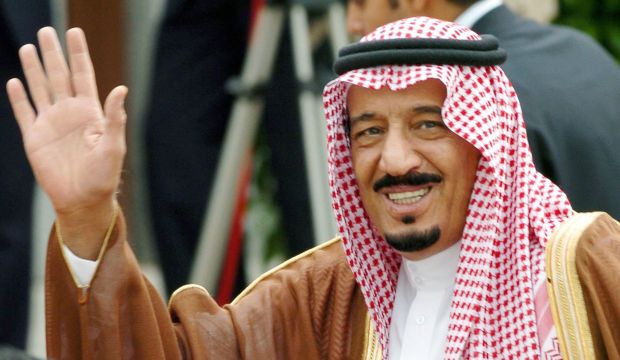Riyadh, Asharq Al-Awsat—It is difficult to do justice here to the remarkable traits of leadership and humanity possessed by Saudi Arabia’s new King Salman Bin Abdulaziz, who succeeded his late brother King Abdullah on Friday.
With over six decades of experience in Saudi governance King Salman has a distinguished record of groundbreaking leadership and humanitarian activism.
Observers often draw parallels between the founder of the Kingdom, late King Abdulaziz Al Saud, and King Salman, his 25th son, who inherited many of his father’s traits and skills, including his faith and a passion for knowledge.
He is an avid reader of history, sociology, politics and economy, and his personal library, which he has amassed over several decades, testifies to his love of culture.
He has been awarded several medals and honors, including the Order of Abdulaziz Al Saud, Saudi Arabia’s highest order, and Al-‘Asifah (The Storm) medal by the Palestinian Fatah movement in appreciation of his achievements in 1969.
He was the recipient of the Lifetime Achievement Award of Al-Turath Charity Foundation in the field of urban heritage in 2013. In 1985 former French President Jacques Chirac, then the mayor of Paris, awarded King Salman a medal on the 2000th anniversary of the establishment of Paris. In 1997 he received the United Nations Shield for reducing poverty and he was also awarded the Star of Jerusalem by late Palestinian leader Yasser Arafat.
King Salman served as governor of Riyadh province for 48 years, overseeing the governorate’s expansion and development. When he took office, Riyadh province had a population of just 200,000. When the new Saudi King left the governor’s office, Riyadh province had a population of seven million and had secured its position as one of the region’s major economic hubs.
He became Saudi Arabia’s Defense Minister in 2011 and Crown Prince just one year later, following the successive deaths of Crown Prince Sultan Bin Abdulaziz in 2011 and Crown Prince Naif Bin Abdulaziz in 2012.
His success in different fields has attracted the attention of writers and journalists who have explored some of the critical moments in King Salman’s life despite his tendency to keep out of the limelight.
In his Salman Bin Abdulaziz: The Other Side late Saudi writer and intellectual Zine Al-Abidine Al-Rikabi documented some of the unknown aspects of the life of the statesman.
Rikabi elaborates on an incident that highlights the monarch’s clarity of vision and familiarity with issues of the twenty-first century.
In a meeting with a delegation from Harvard University in Riyadh, King Salman, then Governor of Riyadh, touched on the misunderstanding that ensues when equating Islam with terrorism.
“The problem is neither in the source or the approach but in extremists, be they Muslims, Christians or Jews, who misunderstand religion and implement it in a wrong way,” he told the delegation.
He also emphasized his country’s belief in tolerance and freedom of worship, citing legal and Islamic sources to back up his argument.
King Salman warned of the dangers of religious extremism in the West, emphasizing that fanatics, no matter what religious beliefs they hold, strain the relationship between divine religions and states.
After taking the throne on Friday, King Salman pledged to continue the “true approach” of his predecessors. “I am, God-willing, to carry out this great trust. We will continue, with God’s grace and strength, committed to the true approach which was followed by this state since its inception at the hands of the founder, King Abdulaziz, God’s mercy upon him, and at the hands of his sons after him, God’s mercy upon them,” he said.
“The Arab and Islamic nation is in dire need today of unity and the maintenance of solidarity. We will continue in this country, that God has honored by choosing it as a platform for His message and as the direction Muslims must pray. Our march is to undertake everything possible to keep the unity of our ranks and the unity of word and in defense of our nation’s issues, guided by the teachings of our true Islamic religion which was favored by the Lord to us, the religion of peace, mercy and moderation,” the King added.
“I ask God to assist me to serve our dear people and realize their hopes, and to preserve our country and our nation’s security and stability, and to protect them from all evils, for He is the master and able to do that. There’s no strength except with God,” King Salman’s first statement as Saudi monarch concluded.

